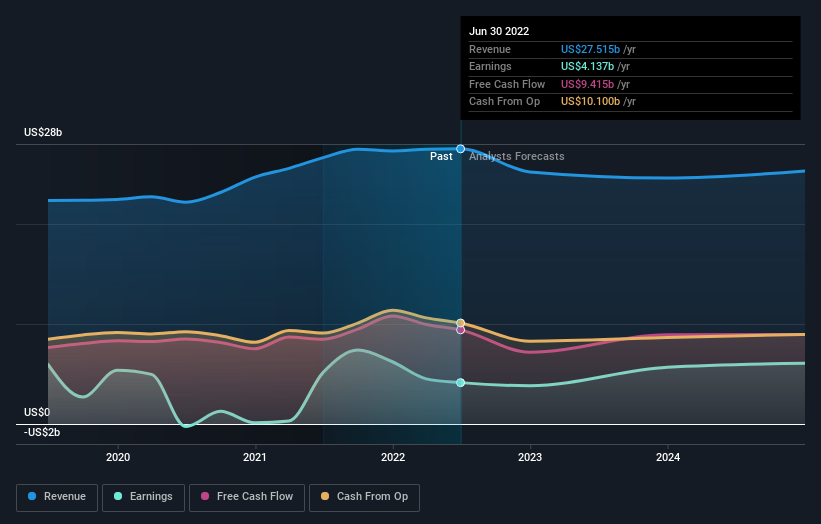Institutional owners may take dramatic actions as Gilead Sciences, Inc.'s (NASDAQ:GILD) recent 4.2% drop adds to one-year losses
A look at the shareholders of Gilead Sciences, Inc. (NASDAQ:GILD) can tell us which group is most powerful. We can see that institutions own the lion's share in the company with 81% ownership. In other words, the group stands to gain the most (or lose the most) from their investment into the company.
And institutional investors endured the highest losses after the company's share price fell by 4.2% last week. The recent loss, which adds to a one-year loss of 7.5% for stockholders, may not sit well with this group of investors. Often called “market makers”, institutions wield significant power in influencing the price dynamics of any stock. As a result, if the decline continues, institutional investors may be pressured to sell Gilead Sciences which might hurt individual investors.
Let's delve deeper into each type of owner of Gilead Sciences, beginning with the chart below.
See our latest analysis for Gilead Sciences
What Does The Institutional Ownership Tell Us About Gilead Sciences?
Many institutions measure their performance against an index that approximates the local market. So they usually pay more attention to companies that are included in major indices.
Gilead Sciences already has institutions on the share registry. Indeed, they own a respectable stake in the company. This implies the analysts working for those institutions have looked at the stock and they like it. But just like anyone else, they could be wrong. When multiple institutions own a stock, there's always a risk that they are in a 'crowded trade'. When such a trade goes wrong, multiple parties may compete to sell stock fast. This risk is higher in a company without a history of growth. You can see Gilead Sciences' historic earnings and revenue below, but keep in mind there's always more to the story.
Since institutional investors own more than half the issued stock, the board will likely have to pay attention to their preferences. Gilead Sciences is not owned by hedge funds. BlackRock, Inc. is currently the largest shareholder, with 10% of shares outstanding. Capital Research and Management Company is the second largest shareholder owning 9.1% of common stock, and The Vanguard Group, Inc. holds about 8.8% of the company stock.
A closer look at our ownership figures suggests that the top 20 shareholders have a combined ownership of 50% implying that no single shareholder has a majority.
While it makes sense to study institutional ownership data for a company, it also makes sense to study analyst sentiments to know which way the wind is blowing. Quite a few analysts cover the stock, so you could look into forecast growth quite easily.
Insider Ownership Of Gilead Sciences
While the precise definition of an insider can be subjective, almost everyone considers board members to be insiders. The company management answer to the board and the latter should represent the interests of shareholders. Notably, sometimes top-level managers are on the board themselves.
I generally consider insider ownership to be a good thing. However, on some occasions it makes it more difficult for other shareholders to hold the board accountable for decisions.
Our most recent data indicates that insiders own less than 1% of Gilead Sciences, Inc.. It is a very large company, so it would be surprising to see insiders own a large proportion of the company. Though their holding amounts to less than 1%, we can see that board members collectively own US$38m worth of shares (at current prices). It is always good to see at least some insider ownership, but it might be worth checking if those insiders have been selling.
General Public Ownership
The general public-- including retail investors -- own 19% stake in the company, and hence can't easily be ignored. While this size of ownership may not be enough to sway a policy decision in their favour, they can still make a collective impact on company policies.
Next Steps:
While it is well worth considering the different groups that own a company, there are other factors that are even more important. For example, we've discovered 3 warning signs for Gilead Sciences that you should be aware of before investing here.
If you would prefer discover what analysts are predicting in terms of future growth, do not miss this free report on analyst forecasts.
NB: Figures in this article are calculated using data from the last twelve months, which refer to the 12-month period ending on the last date of the month the financial statement is dated. This may not be consistent with full year annual report figures.
Have feedback on this article? Concerned about the content? Get in touch with us directly. Alternatively, email editorial-team (at) simplywallst.com.
This article by Simply Wall St is general in nature. We provide commentary based on historical data and analyst forecasts only using an unbiased methodology and our articles are not intended to be financial advice. It does not constitute a recommendation to buy or sell any stock, and does not take account of your objectives, or your financial situation. We aim to bring you long-term focused analysis driven by fundamental data. Note that our analysis may not factor in the latest price-sensitive company announcements or qualitative material. Simply Wall St has no position in any stocks mentioned.
Join A Paid User Research Session
You’ll receive a US$30 Amazon Gift card for 1 hour of your time while helping us build better investing tools for the individual investors like yourself. Sign up here

 Yahoo Finance
Yahoo Finance 

